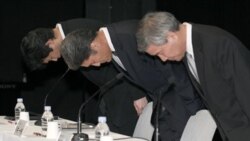This is the VOA Special English Technology Report.
Sony officials held a news conference last week in Tokyo.
(SOUND)
They apologized for the theft of personal information from millions of users of the company's online services. Hackers targeted Sony's PlayStation Network, Sony Online Entertainment and Qriocity music systems. In all, Sony says information may have been stolen from more than one hundred million accounts.
The data includes information like names, addresses, phone numbers and birthdates. In some cases, even credit and debit card numbers may have been stolen.
The United States Federal Bureau of Investigation is looking into the cyber attacks.
Sony shut down its PlayStation Network on April twentieth. The company is being criticized for not telling its users about the stolen information until a week later. Sony has also been criticized for not making its accounts more secure by encrypting the data. Sony officials say they have now taken steps to improve security.
Peter Warren is chairman of the Cyber Security Research Institute in London. His group studies technology crimes and their effects on our computer-dependent world. Mr. Warren points out that what happened at Sony is not rare.
PETER WARREN: "We’ve seen a number of very large companies that have suffered some tremendously embarrassing losses of data. So I actually think that it's a learning curve for everybody."
The problem, says Mr. Warren, is that there is far more interest in developing technology than in keeping it safe.
PETER WARREN: "There is a very real issue with the onward speed of technological progress and the fact that lots and lots of people are being allowed to connect a lot of technology up before it's really been particularly well-tested."
Peter Warren also points out that many people have a false sense of security on the Internet.
PETER WARREN: "If they’re walking down the street, they have many of their senses with them and they're very, very aware of strangers. On the Internet they seem to be so blindly trusting of anybody and of any website, no matter how suspicious it may look."
His message to users is simple: try to be more careful online.
PETER WARREN: "Everybody just really needs to be aware that the Internet is just like any other street and there are some twists and turns that can take you in to some very, very unsavory places.”
And that's the VOA Special English Technology Report, written by June Simms. Have you ever been the victim of a cyber crime or know someone who has? Tell us at voaspecialenglish.com. I'm Christopher Cruise.



